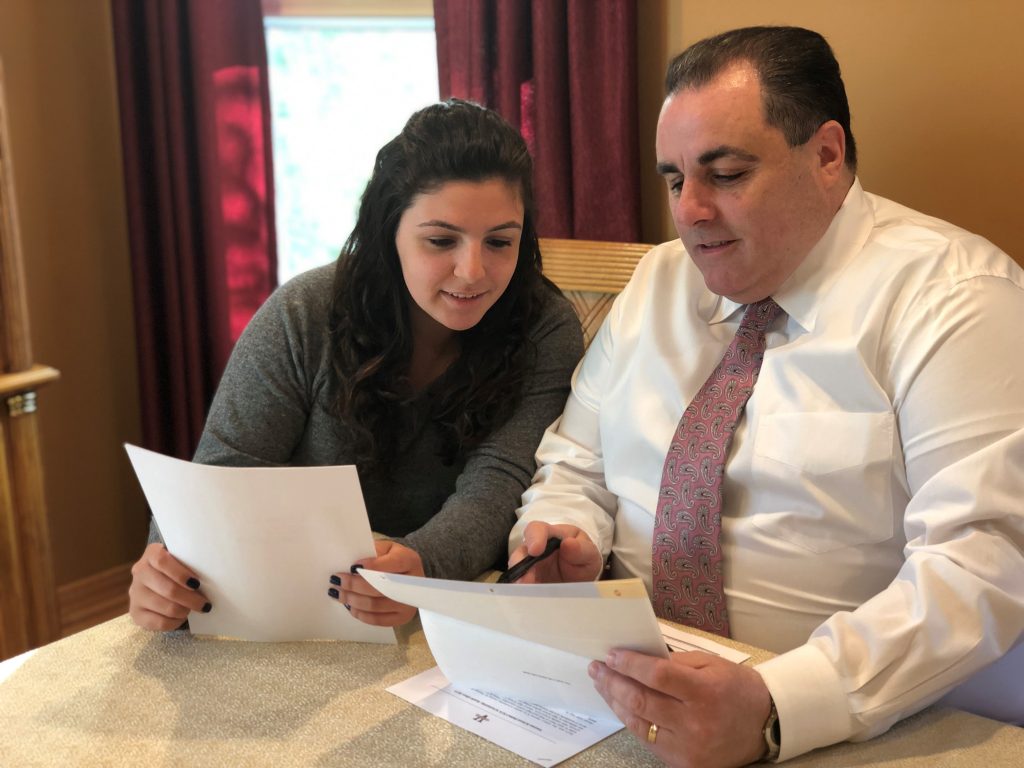
Insights & Inspiration by George Celentano, SVP of Retail Banking
This month we celebrate Financial Literacy Month and I believe it is so important to teach children about finances. At home, it’s what I’ve done with my own daughter since she was a young child. Today, she is 18 years old, has no debt and is doing a really good job of managing her money and understanding how finances work. She gets it!
Wealth is not determined by how much money you make but rather how much you save. Conceptually, I think people have to understand that. Many people live above their means and as a result, can’t save because all their money goes to paying bills. If people want to live a comfortable life and amass wealth over time, they have to understand that they need to save. I’ve spent years teaching my daughter this very simple concept.
As a young man, starting a 401K account is what kind of opened my eyes and got me excited about saving. Free money was something I can get excited about! With my daughter, I explained to her that a 401K is the only plan that offers you “free” money and you should take full advantage of it. I recommend that you save, at minimum, what the company is willing to match. You can save more, but don’t do less than the match that is being offered to you because then you are throwing away free money.
To educate and get my daughter excited about saving money, I introduced the concept of a 401k to my daughter. I offered to match 100% of any money that she saved from birthdays and holidays. Now, as a young child she didn’t understand high-finance yet, but she did like to see her money grow. I made it very exciting for her to save. Thus, I opened a Kids Passbook Savings for her. The passbook is something my daughter loved because she was able to see her balance grow every time she made a deposit. Then one day, I realized my daughter actually understood the 401k concept of free money when she came to me and said, “Dad put this $700 in my passbook and don’t forget to match it. And then she said, after you match it, please take $200 out so I can go shopping.” I said to her, “It doesn’t work that way honey; I will match only what you are willing to save.”
My daughter now understands the value of savings. When she gets her paycheck, she first pays herself in the form of depositing money into her savings account. Then she pays any bills that are due for the month, such as her car payment or insurance payment etc. What is left is her disposable income for her to spend as she wants. I always told her she should save at least the same amount that she pays in social security tax, at minimum. However, I told her if she never wants to be dependent on Social Security, she should save at least 25% of her net pay every pay period. This would guarantee her a very comfortable financial future.
Now, as her savings account has built up over time, I explained to her that she would need to take some of those funds and invest them into longer term investment options offered in the stock market so that she could maximize the return on her money and keep up with the pace of inflation. I explained to her how inflation eats away at the value of her savings and that’s why it’s critical to have returns that equal or surpass the rate of inflation. I have a good friend of mine who is a broker who is educating my daughter on investing in the market. She is learning the difference between secured and unsecured investments, the risk vs. reward concept and market cycles. This is critical for her to understand if she wants to build wealth.
Last but not least, I’m starting to teach my daughter about insurance. Insurance helps you protect your assets and provide security for your family. It is something that many young people do not think about or plan for. However, everyone should have insurance. The younger you are, the cheaper it is to buy. It’s important to understand what type and how much insurance you buy to protect yourself.
Everything I’ve taught her over the years was in service of building and protecting her wealth. It is important to learn about building wealth from a young age so that you can ensure yourself a financially comfortable future.
If you are interested in getting your child started with a savings account, Spencer is here to help you choose the right one. We have a SpencerKids savings account for children under the age of 21. We also have a StudentEdge savings account which is perfect for the 17-23 year old student. Get your child started on the road to becoming a lifelong saver! Learn more about our savings accounts on our website, visit your local branch, or call us at 1-800-363-8115 today!

